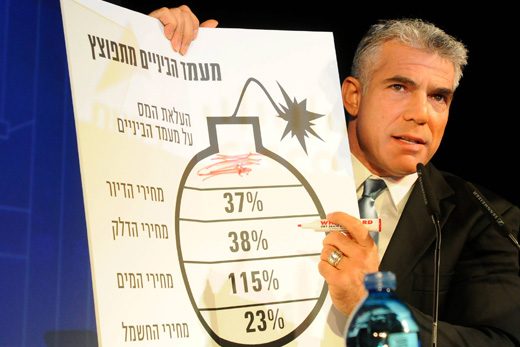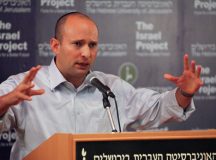The success of Yesh Atid, winning 19 Knesset seats just one year after its formation is politically dramatic and culturally significant.
In Israel’s national elections, the victor is usually defined as belonging to the left or right. This time, however, the winner belonged to the centre. Yair Lapid – now the leader of Israel’s second largest party Yesh Atid (There is a Future) – positioned himself as the choice of those who could not choose between the leaders of the right or the left. As the old Jewish saying goes, ‘while the two were battling, the third one took it all.’
The decision of half-a-million Israelis to vote for Lapid is politically dramatic, but it is also suggestive of a wider cultural phenomenon that has swept across Israel over the past two decades: the elevating to the status of ‘cultural hero’ of an ordinary person who can touch your heart through popular media platforms while hardly challenging you intellectually. This phenomenon, in part, is caused by a sense of despair with traditional politics and politicians. It involves a quest for the new, the exciting, and the one-we-still-haven’t-tried. Israel’s social protests in 2011 – when hundreds of thousands of Israelis took to the street and told the country’s leadership they had had enough, without being able to define what it was they wanted – were both a consequence and a expression of this phenomenon.
Onto this new political and cultural terrain strode Yair Lapid, Israel’s most popular news anchor and talk-show host. A man who in the past has written a popular column, songs and books – a man once defined by his celebrated father, Tommy Lapid, as ‘all that’s Israeli’. In this election, Lapid became the answer for those voters who knew what they didn’t want but differed on what they did want.
Lapid’s breakthrough was certainly dependent on a profound discontent with Netanyahu. But more than this, his campaign embodied new political sensibilities. He has ‘emotional intelligence’ in abundance – he was able to find the right words, touch the right subjects, strike the right tones, and have the right look. Yes, his policy positions were blurred, but this only helped different sectors of Israeli society identify with him. Those who believed in the need for a negotiated settlement with the Palestinians could find an aspiration for peace, while those who wished to stand strong against concessions could take solace in his commitment to an undivided Jerusalem. For those who felt there was too much waste in the government’s budget his main slogan ‘where’s the money?!’ was popular, while those who feared Labour’s ‘socialism’ rallied behind his call to stop attacking the upper class. The TV man’s ability to find the right words for his readers and viewers transformed into the politician’s delivery of the right ‘message’ for the voters – from a speaker for the consensus, he became the consensus.
What now? Lapid’s positioning in the centre and his nineteen Knesset seats makes him the kingmaker in the coalition building process. Theoretically, Netanyahu can form a narrow coalition without him, but practically, he needs Lapid with him. Lapid can also force Netanyahu to abandon his political base and create a government without the right or ultra-orthodox parties, but practically he needs to balance Netanyahu’s existing base with other centre-left parties. So the coalition will be built on compromises and what almost everyone can agree on: the need for a change in the military or national service of the ultra orthodox. It will likely tiptoe around the peace process, economic burden sharing and the electoral system.
The election night may well be the last happy night Lapid has in politics. It is impossible to embody Israel’s new cultural mood when you are the one making the hard political and economic decisions, but for now, Lapid (torch, in Hebrew) is living up to his name. He has shed a flaming light on the Israeli centre and made it the most important force on Israel’s political map. For now, Lapid is at the centre of all things.





































